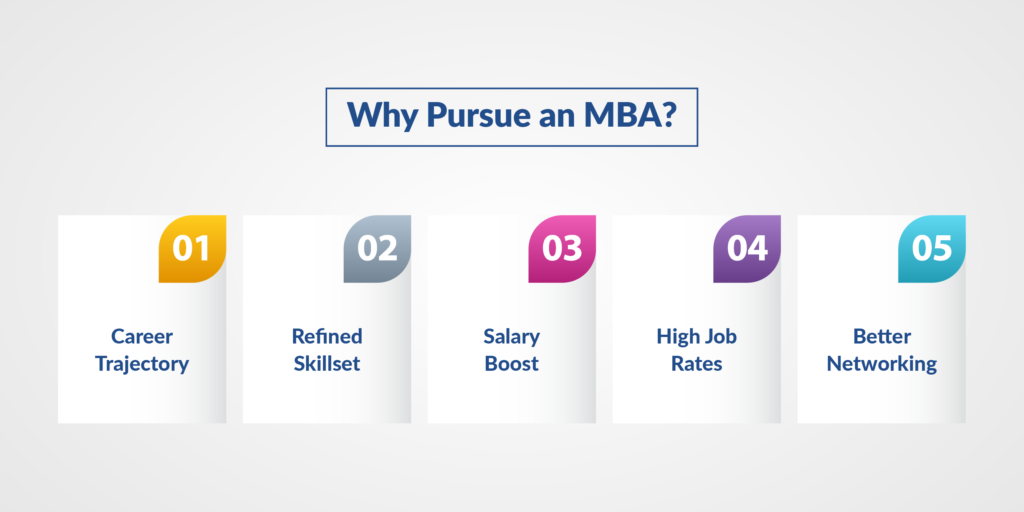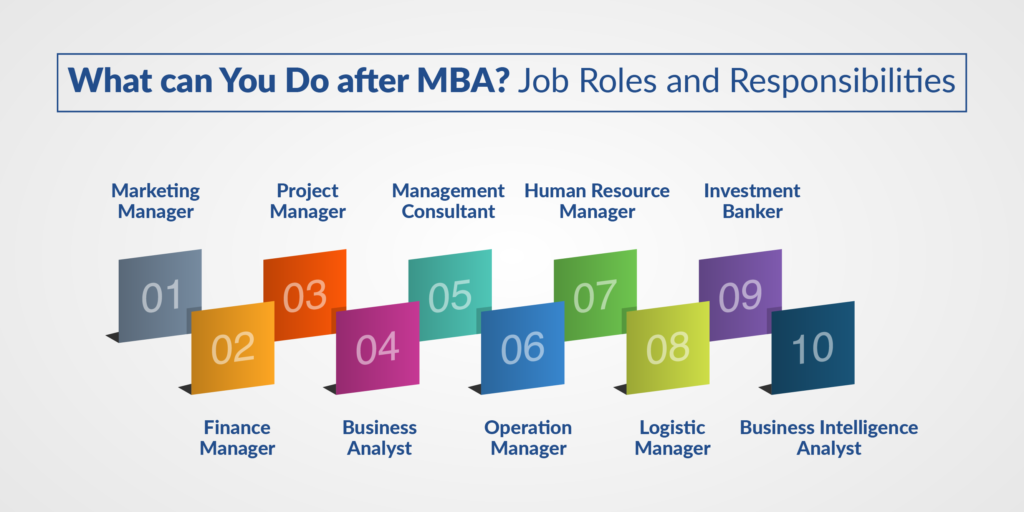An MBA is not just a comprehensive two-year postgraduate program; it’s a transformative journey that delves into various business functions. It equips you with the essential components of leadership roles across diverse fields, opening up a multitude of career opportunities.
According to a Custom Market Insight report, the MBA program is not just a significant player in the market; it’s a powerhouse. With a size of 47.1 billion in 2022, it’s projected to grow even further, reaching 83.08 billion at a CAGR of 15.6% by 2022. This growth underscores its relevance and the high demand for MBA graduates.
This article will delve into the vital information and key aspects of what can you do after MBA, including roles such as financial analyst, marketing manager, operations director, and more. These are just a few examples of the diverse and exciting career paths that an MBA can lead you to.
Why Pursue an MBA?

An MBA is a coveted program that offers thriving career goals in various business fields. Here’s why an MBA is necessary and a game-changer for your job.
- Career Trajectory – An MBA is a proven degree that helps candidates face complex business challenges and lead teams with innovative ideas for improving the company.
- Refined Skillset– An MBA degree prepares you beyond key business areas and helps you build necessary skills such as leadership, management, problem-solving, strategic thinking, etc.
- Salary Boost– Enrolling in an MBA program isn’t just about opening doors to high-profile fields; it’s about increasing your earning potential within top organisations, leading to a brighter financial future.
- High Job Rates— According to the Labor of Beurea Statistics source, the job rate in management is anticipated to grow 5% from 2019 to 2029. The source correctly states that the demand for MBA degrees is soaring in the business market, bringing vital change within the industry sector.
- Better Networking– An MBA degree helps you navigate and achieve your career goals through diverse networking. A strong connection between peers and alumni fosters valuable ideas that help you find a better job opportunity.
Scope of MBA in India
In India, the scope of an MBA is highly valued and brings remarkable career options. According to a Times of India source, the job rate of MBA graduates is around 54%, which marks the highest potential among professional courses.
Let’s examine the following points, which can help you make the right decisions about what can you do after MBA.
- Marketing Sector—MBA graduates have numerous job opportunities in marketing, and many MNCs hire them to bring positive innovation and change within the industry.
- Human Resource Sector—The HR sector has immense scope in India, and significant roles like HR manager, Talent Acquisition Specialist, Talent and Training Manager, etc., can shape a mindful career and help employees earn potential salaries.
- Retail Sector—MBA graduates have a scope in the retail industry that comes with vast career opportunities, such as store technology manager, store manager, category manager, etc. Those aiming for a retail career can possess a relevant position considering its growth and development.
- Information Technology Sector—The career opportunities in the IT sector are vast, with high pay scales and exciting job roles such as analytical manager, IT manager, data processing manager, etc.
Read More: The Ultimate Guide to MBA After 12th: Eligibility, Job Profiles, Exams and Career
What Can You Do After MBA? Job Roles and Responsibilities

An MBA program provides a plethora of career opportunities depending on the level of skills, work experience and expertise. Here is the table of the most in-demand job options an MBA graduate can choose.
| Job Roles | Job Responsibilities |
| Marketing Manager | Their task involves planning, overseeing and executing the overall business campaign. They work on the core functions of marketing management that deal with aligning and analysing company goals. |
| Finance Manager | They work on the reports and prepare long-term investment goals. They check on the profit and investment of the company to meet financial goals. |
| Project Manager | These professionals are significant in organising and planning the project to impact the company’s innovative goals.They manage the risk involved in the project and deliver benefits to the projects. |
| Business Analyst | The work of a business analyst is to examine organisational performance and make insightful decisions to achieve industry growth. |
| Management Consultant | The responsibility of a management consultant is to improve business performance within the organisation to achieve goals.They make strategic decisions that increase profitable revenue for the company. |
| Operation Manager | The key responsibility of an operation manager is to look at the day-to-day processing and operation services. |
| Human Resource Manager | These professionals are the organisation’s recruiting team that deals with day-to-day employee-related problems and oversees the new staff.Their job includes handling the entire company’s floor and dealing with employee relations. |
| Logistic Manager | Their duties involve purchasing and delivering the goods on all parts of the supply chain. |
| Investment Banker | Their primary work involves helping clients secure their funds in the capital markets.They broadly help their clients with financial challenges, wealth and trade management, etc. |
| Business Intelligence Analyst | Their duties involve data and information to make informed management decisions.They have robust data analysis that effectively changes business strategies and improves operations. |
Top Recruiters Hiring MBA Graduates
The demand for MBA graduates is high in the job market, which leads top recruiters to hire them for their company’s growth and success.
If you are someone pondering what can you do after MBA? In that case, it’s worth noting that many top multinational companies have hired MBA graduates to welcome work efficiency within their organisation. Here are a few of them:
- JPMorgan Chase
- Deloitte
- Accenture
- ICICI Bank
- McKinsey
- Goldman Sachs
- Amazon
- Microsoft
- KPMG
- Wipro
Salary Trends for MBA Specialisation
The salaries of MBA graduates depend heavily on their specialisation and industry choice. Below is a table that includes average salaries from diverse sectors.
| MBA Specialisation | Average Salary (Annual) |
| Marketing | INR 7,00,000 |
| Finance | INR 6,00,000 |
| Operations | INR 10,00,000 |
| Human Resource | INR 6,00,000 |
| Information Technology | INR 8,00,000 |
| Data Analytics | INR 6,00,000 |
Please note: The above salary depends on the company’s size, work experience, location, etc.
Bottom Line
An MBA program can be a game-changer, elevating your career journey and bringing solid advancement in the industrial sector. If you are among those who wonder what can you do after an MBA, then there are high-demand opportunities in the business market that can shape your life with the right job roles.
Enrol today with Hike Education, which offers similar guidance to help you move strategically toward your career path.
What Can You do After MBA : FAQs
Q1. What can you do after MBA?
There are numerous career opportunities are available after an MBA program, such as Marketing Manager, HR Manager, Finance Manager, Business Analyst, Project Manager, etc.
Q2. Is MBA good for the future?
MBA degree holds potential value worldwide, and with evolving digitisation, the future is promising and secure.
Q3. Is an MBA worth the investment?
Yes, an MBA degree is worth the investment because it provides career growth, salary hikes, skill development, etc.
Q4. What are the top 5 MBA specialisations?
There are many specialisations, but the top five are Finance, Marketing, Human Resources, Business Analytics, and Information Technology.
Q5. Can I pursue an MBA while working full-time?
Indeed. Many top universities, such as Amity, Manipal, and Symbiosis International, offer online MBA programs that offer flexibility and work-life balance.
More Information:
Will An Online MBA Help In My Career? Key Points To Focus In 2024


